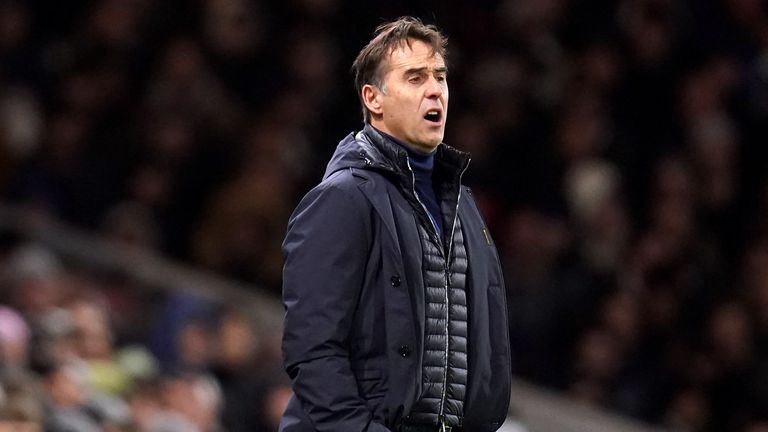If a club were trying to get itself relegated then selling your best player and spending none of the money before parting ways with the head coach days before the season begins would be a good way to start. Wolves are already the Premier League’s crisis club.
Julen Lopetegui has left by mutual consent amid dark hints of broken promises. Ruben Neves heads a list of high-profile exits while the only arrival at Molineux has been reserve right-back Matt Doherty – on a free transfer. It is not the rebuild he demanded.
Nobody comes out of this well. Everybody agrees that Wolves’ hopes of staying in the Premier League this season are compromised by the loss of an elite manager. But Lopetegui was backed with big money in January and the financial pressures at the club are real.
It is hard for Wolves to regret appointing him in the first place when his impact was so positive. The former Real Madrid and Spain coach had inherited a bleak situation with the club bottom of the Premier League table at Christmas but he changed everything.
Wolves eventually finished in the top 13 for a fifth consecutive season. But they effectively spent the summer budget in January to do so. Matheus Cunha came in for a bloated £43m fee. Pablo Sarabia, Mario Lemina, Joao Gomes and Craig Dawson arrived too.
What is unclear is how aware of that Lopetegui, who took some time to be convinced to come to Wolves, was back in January. “We came here believing in a different project,” he told Guillem Balague recently. Even the plan B had been abandoned, he argued.
Wolves have brought in almost £70m this summer through the sales of Nathan Collins and club captain Neves alone. A number of other big earners including Joao Moutinho, Adama Traore, Raul Jimenez, Conor Coady and Diego Costa have also now departed.
Lopetegui lost faith when told he would not see any of it reinvested and while the club is pointing to Financial Fair Play restrictions, some supporters want owners Fosun to sell. Many doubt their commitment despite chairman Jeff Shi’s open letter to the fans.
Why is FFP a problem for Wolves?
FFP is an issue for Wolves. Losses of £105m are permitted over a three-year period. The last accounts released were for 2021/22 and revealed a loss of £46m. The 2022/23 accounts will not be published until next year but another large loss is anticipated.
There is a need to reverse the trend, even the need for a net profit. The problem is that though significant money has been brought in by those summer sales of Neves and Collins, in particular, the accounting situation means it is more complicated than that.
To understand the predicament at Wolves means delving into a dry discussion around amortisation, the accounting principle that allows the cost of an asset to be spread over its useful life. It is designed to reflect the capital expenditure of a business more accurately.
For example, a player signed for £20m who agrees a four-year deal will see that transfer amortised at £5m per year. As a result, in the accounts, the costs of a player signed three years ago are greater than just their wages. There is amortisation to factor in as well.
This is the difference between the cash flow and the accounts and it helps to explain some of the challenges that Wolves are facing in trying to turn a profit this season. It is not as simple as bringing money in. The book value of the player must be considered.
When Ryan Giles, an academy product, is sold to Luton Town for £5m that represents pure profit. When Jimenez leaves for slightly more than that, the situation is very different because he retains a significant book value having been signed for £30m four years ago.
The signings of Nelson Semedo and Fabio Silva in the summer of 2020 might seem part of the dim and distant past, the best part of £60m long since spent, but a chunk is still there on the balance sheet – hitting the profit and loss account in full when sold.
The consequences of this will be shaping decision-making. There is the example of Goncalo Guedes who failed to settle following his £28m arrival from Valencia last season and would appear to have no future at Wolves. He was loaned to Benfica in January.
Selling Guedes for whatever figure could be recouped might make sense if this were a cash-flow problem. But this would see a huge loss realised on the accounts. As a result, the forward is likely to be loaned out again. Perversely, Wolves cannot afford to sell him.
For the opposite reason, the sale of Max Kilman would likely appeal to those in the finance department at Molineux. The £35m-rated defender signed from Maidenhead has been a target for Napoli and that money would have a big impact on the accounts.
But Kilman also happens to be a key player and, from a sporting perspective, could represent a sale too far, even if it might free up funds to invest in targets that would rebalance the squad. The threat of relegation is an added layer of jeopardy in this process.
How weak is this Wolves squad?
Despite the negative noises, supporters understandably concerned, Wolves are not yet doomed to return to the Championship. In fact, the squad that remains contains considerable quality. Few who have left were key to Lopetegui’s revival.
In defence, Coady was out on loan anyway and Collins was dropped from the team in January. Jonny Otto and Rayan Ait Nouri could still depart but neither played a minute during the run of four consecutive home wins without conceding that kept Wolves up.
No team has kept more Premier League clean sheets in front of their own fans in 2023 and that first-choice defence remains. In midfield, Matheus Nunes, signed for £42m last summer, could partner January arrivals Lemina and Gomes – both fan favourites already.
Losing Neves is a major blow but the time was right for other big names to move on. Moutinho, 37 in September, did not start any of the final nine games of the campaign. Jimenez, who failed to score a Premier League goal last season, barely featured either.
The need for goals is still the biggest concern although the pedigree of player in attack is also impressive. The trio of Cunha, Sarabia and Pedro Neto started the pre-season win over Porto. They are full internationals for Brazil, Spain and Portugal respectively.
That half of the outfield players in the anticipated starting line-up against Manchester United on the opening Monday Night Football of the season have come in since Lopetegui’s appointment provides some context to his complaints. But there are clearly still issues.
Season of struggle for Wolves?
Should Daniel Podence depart, the returning Doherty and fellow defender Dawson are the only men in the squad in double figures for Premier League career goals. In each of the past three seasons, no Wolves player has scored more than six in all competitions.
That will surely need to change if they are to avoid the sort of ignominious slide suffered by Leicester City last season – and it is the example of events over in the East Midlands that feels pertinent right now given the lack of incomings likely at Molineux this summer.
Leicester had quality too but it did not save them when they failed to refresh and the malaise set in. The contrast in mood at Nottingham Forest felt decisive in the run-in last season. One club galvanised by their precarious position, another broken by it.
Lopetegui’s public pronouncements were prompted by thoughts of self-preservation as well as frustration. He felt compelled to protect his own reputation. But he also wanted to reset the narrative at Wolves, aware that outsized expectations needed to change.
Even his own players appeared off-message. Just weeks ago, midfielder Nunes was raising the bar rather than lowering it. “We have enough quality players to try to stay in the top eight,” said the Portuguese. “That has to be our aim.” It is also part of the problem.
It is easy to see a scenario where Wolves are level with Luton six games into the season and the atmosphere surrounding the two clubs could not be more different. If a coach can reframe this as survival equalling success it would make a difficult job more doable.
Perhaps that is the only encouraging thought for Wolves. Much like at Bournemouth last season when Gary O’Neil replaced Scott Parker, the wider world will be tempted to write them off now. But if they stick together in trying circumstances, there is a way through it.
How plausible is that for players and supporters? They rallied late last season in the belief that better times lay ahead if they could just stay up. Now they are being told the same at the beginning of the new season. It is the worst start. The ending is not yet written.




